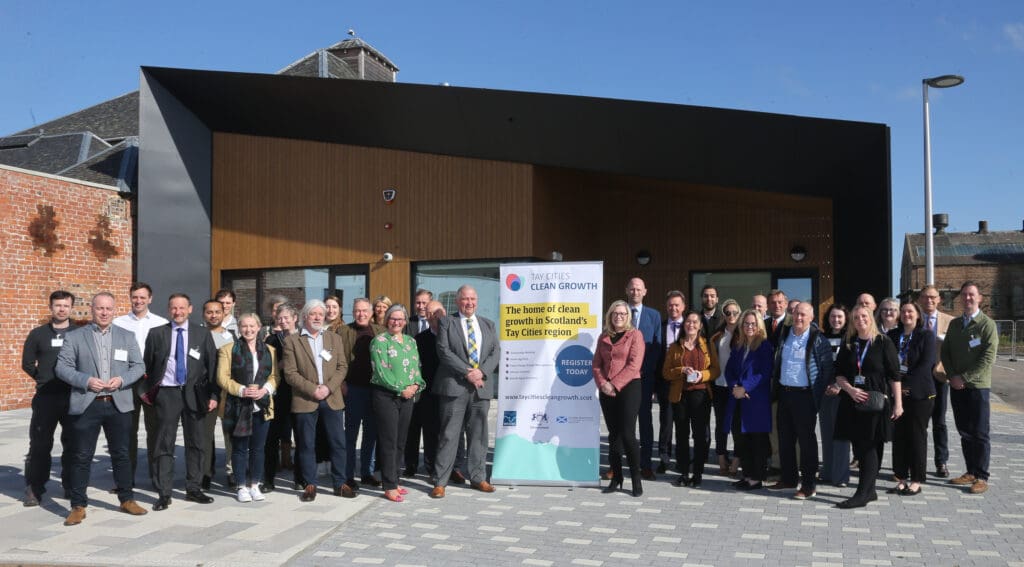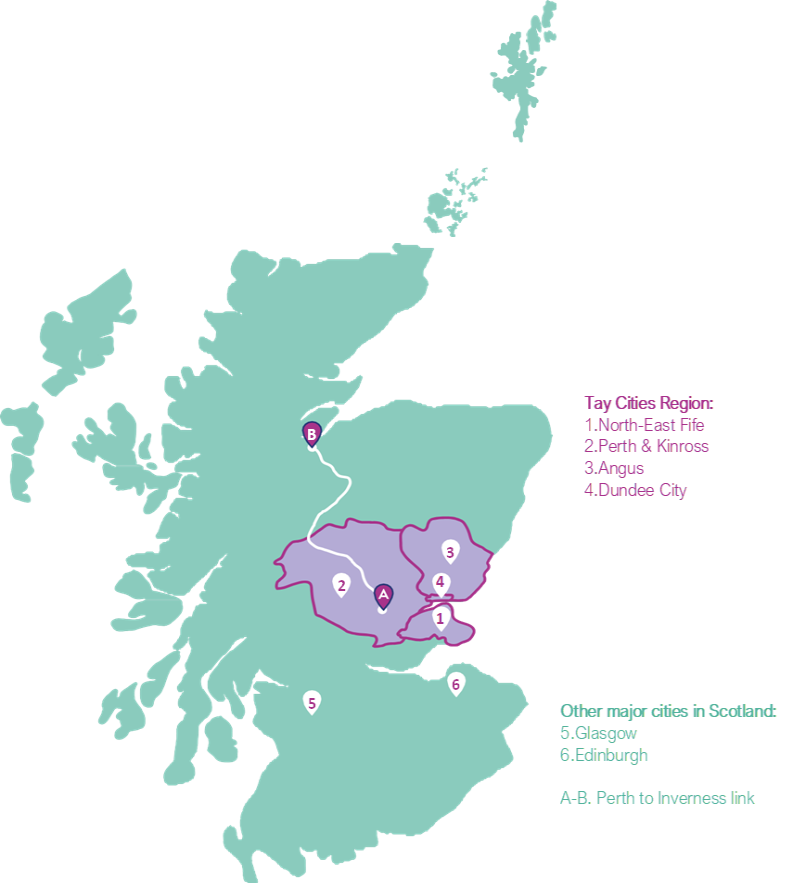
Welcome to the Tay Cities region: where ideas are transformed into innovation. With a proud industrial history dating from the 19th century, the region is steeped in heritage and culture. Today, the area continues to build upon its legacy of discovery by encouraging collaboration across a range of industries, from digital technologies to renewable energies.
The Tay Cities Clean Growth initiative is designed to discover, encourage, nurture and help commercialise synergies between businesses, projects, academia, public sector and funding with special focus on 5 sectors.
– Circular Economy
– Green Agritech
– Clean Energy
– Sustainable mobility
– Data & Digital Solutions
With a pipeline of investments in place to build on the area’s success, there has never been a better time to get involved.
Supported by the Tay Cities Region Deal – which brings together public, private and voluntary organisations to deliver a smarter and fairer region while promoting inclusion, innovation internationalisation and better connectivity across digital and physical infrastructure.
What does this site offer:
The website showcases a mix of clean growth projects not only in the Tay Cities Region Deal, but extending beyond to enable inter-project synergies, wider project development, knowledge exchange and R&D collaboration, as well as creating an environment for investor engagement. The website acts as a central platform to facilitate, support and accelerate clean growth across Tayside and position the region domestically and internationally.
Please visit the ‘Projects’ and ‘Organisations’ pages to find out more about the region’s clean growth activities, businesses and key individuals. Feel free to reach out to the project owners directly for advice or connect with others in the network (see ‘Members’). You will find businesses, individuals, universities and other Research & Development facilities to learn from. You can share ‘News’ or start a conversation in the ‘Forum’ function as well as search for ‘Funding’ opportunities.
With its central geography, mixed economy and broad base of academic, professional expertise and active developments, Tayside is a great place to exploit this ongoing economic transformation as we address climate change, economic recovery and capture the opportunities provided by the transition to a net zero, green future.

Circular Economy
The Tay region of Scotland embraces the circular economy model to enhance sustainable development and economic resilience. This approach minimises waste, reuses resources, and regenerates natural systems, significantly reducing the region’s environmental footprint and conserving its natural landscapes. Economically, it fosters innovation, creates green jobs, and boosts local business competitiveness by promoting resource efficiency. The Binn Eco Park in Glenfarg exemplifies this model by integrating waste management, recycling, and renewable energy production into a closed-loop system that transforms waste into valuable resources. Other notable projects include the Tay Cities Region Deal, the James Hutton Institute’s sustainable agriculture research, and community-led enterprises like Zero Waste Perth. These initiatives collectively demonstrate the region’s commitment to sustainability and innovation, illustrating how circular economy principles can drive economic growth, enhance resource efficiency, and contribute to Scotland’s broader climate goals.
If you have a circular economy project, please visit the ‘projects page’ and add your own.
Find out moreClean Energy
The Tay Cities Region within Scotland is at the forefront of clean energy production and storage, driven by the urgent need to combat climate change and foster economic resilience. Leveraging its abundant natural resources, the region integrates renewable energy sources complemented by advanced energy storage technologies. Key initiatives, such as those at the University of St Andrews’ Eden Campus and the Binn Eco Park play a critical role in this transition by reducing carbon emissions and fostering innovation through interdisciplinary research and collaboration. This strategic focus on clean energy not only enhances local energy security and reduces dependence on fossil fuels but also stimulates economic growth and job creation, positioning the Tay Cities Region as a global leader in sustainable development. Through these efforts, the region exemplifies how embracing renewable energy can drive economic prosperity, putting us on a pathway to deliver emissions reduction through a just transition to net zero.
If you have a clean energy project, please visit the ‘projects page’ and add your own.
Find out moreData & Digital Solutions
The Tay region is at the forefront of the digital economy, where data drives economic growth and innovation across various sectors, including manufacturing, agriculture, healthcare, cybersecurity, gaming, and tourism. By leveraging data analytics, businesses in the region gain insights into consumer behavior, market trends, and operational efficiency, enabling informed decision-making and competitiveness. The digital economy fosters entrepreneurship, providing small businesses with access to global markets and resources. The region’s digital ecosystem benefits from strong educational support from local universities and colleges, which nurture talent and embrace e-learning to expand access to quality education. Smart city initiatives further enhance urban infrastructure and public services through data-driven decision-making. Investment in digital infrastructure, 5G networks, and technologies like IoT and automation creates job opportunities, attracts investment, and stimulates economic activity. The data and digital sector thus serves as a catalyst for innovation, productivity, and diversification, driving sustainable economic development and positioning the Tay region for long-term success in the digital age. Our region is open to digital collaborations; to learn more about this sector, visit DigiTay.
If you have a digital or data project, please visit the ‘projects page’ and add your own.
Find out moreGreen Agritech
Agri-tech plays a vital role in the Tay region, significantly advancing agricultural productivity and sustainability. Leveraging innovative technologies like GPS-guided machinery, drone monitoring, smart sensors, and vertical agriculture, farmers can optimise resource use and reduce environmental impact. The James Hutton Institute (JHI), a world-renowned research organisation, is pivotal in this transformation, developing precision farming techniques and biotechnologies that enhance crop resilience and sustainability. Through cutting-edge research and partnerships with academic institutions and industry stakeholders, JHI addresses critical challenges in food security, climate change, and natural resource management. This integration of advanced agri-tech not only boosts agricultural output but also promotes environmental stewardship, ensuring a sustainable future for farming communities and contributing to the broader Scottish economy. Initiatives like the Tay Biocluster further illustrate the region’s commitment to leveraging technology for agricultural resilience and sustainability, enhancing economic growth, attracting investment, and creating high-skilled jobs, thereby positioning the Tay region as a leader in sustainable agricultural innovation.
If you have a green agri-tech project, please visit the ‘projects page’ and add your own.
Find out moreSustainable Mobility
Sustainable mobility is crucial for achieving net-zero emissions in the Tay region, addressing climate change by promoting eco-friendly transportation options such as electric vehicles, public transport, cycling, and walking. This approach reduces carbon emissions and air pollution while supporting local economies through green jobs and tourism. Enhanced transportation networks improve social inclusivity, allowing all residents to engage in regional activities. Michelin Scotland Innovation Parc (MSIP) in Dundee exemplifies innovation in sustainability, focusing on battery technology, and renewable energy integration. Various projects, including expanding EV charging infrastructure, bike-sharing programs, low-emission buses, and active travel hubs, further contribute to a sustainable, efficient transportation landscape. These initiatives collectively improve air quality, reduce environmental impact, and foster a healthier, more connected community in the Tay region.
If you have a sustainable mobility project, please visit the ‘projects page’ and add your own.
Find out more